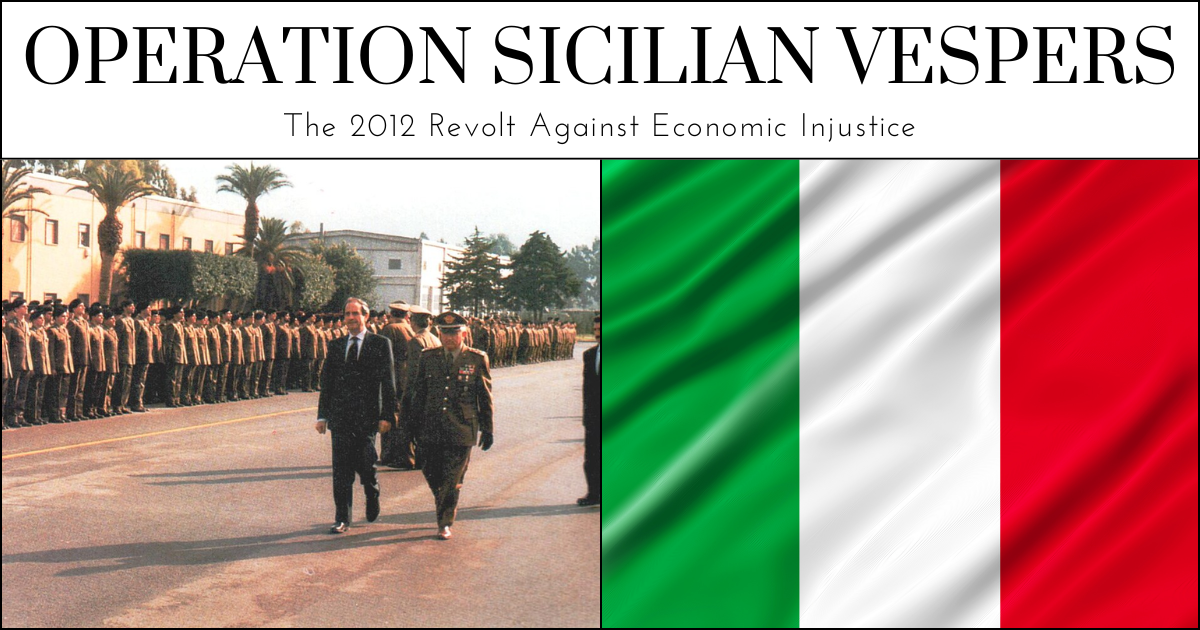Operation Sicilian Vespers: The 2012 Revolt Against Economic Injustice. The Operation Sicilian Vespers was a huge rebellious operation unleashed by the citizens of Sicily, Italy. It resulted in too much damage to the Sicilian, Italian, and Maltese economies. People were also injured in this operation. It was code-named Operation Sicilian Vespers. To know more about the topic “Operation Sicilian Vespers: The 2012 Revolt Against Economic Injustice,” read the complete article.
Operation Sicilian Vespers
The Sicilian protests in 2012 were named by their organizers as Operation Sicilian Vespers, a 5-day blockade of roads and seaports. This operation has a negative impact on the economic state of the country and it brought Sicily and its economy to a standstill in January 2012. Identical protests affecting larger areas of Italy broke out in December 2013. The code name of the blockage refers to the Sicilian Vespers, the successful 13th-century rebellion against Angevin. There were many reasons for the protest, which we will discuss further in the article.

The main objective of the Operation Sicilian Vespers was to demand more help from the government. Citizens wanted the government to do something to solve their economic crisis. There were more movements launched that were headed by disgruntled farmers and lorry drivers. This movement was given its name from the earlier struggles of farmers of Sicily. This movement brought a monetary crisis for the whole country, especially Sicily. In this movement, the people who mostly participated were road haulers, small businessmen, low-paid workers, the unemployed and students.
The 2012 Revolt Against Economic Injustice
The 2012 revolts were all against economic injustice by the government. The protestors wanted justice to be served and they accused politicians who were the main roots of the economic problem. The loose-knit grouping has spread all over the country and has drawn in many different groups who have suffered badly as Italy’s financial difficulties have dragged on. The protesters include road hauliers, small businessmen, low-paid workers, the unemployed and students.
Some of the protestors complain of excessive state regulation and are unhappy about austerity-driven tax hikes. Others have denounced capitalism and the euro. All seem to be united in their contempt for Italy’s politicians, who are accused of failing to address the country’s grave economic crisis. Italy has struggled to reduce national debt as a percentage of GDP since government debt rose to over 100% of GDP in the late 1980s.
Participants and Organizers
Shock Force is a Sicilian political grouping that organized Operation Sicilian Vespers, the 5-day blockade of roads and seaports that brought Sicily and its economy to a collapse in January 2012. Other groups are also represented under the Shock Force umbrella, including the Sicilian Trucking Association, which represents truck drivers and small logistics business interests, and the Pitchforks Movement, which is an unofficial association of farmers, shepherds, and breeders.
The leader of the Pitchforks Movement was Martino Morsello, a 57-year-old former Socialist councillor of Marsala. The name of this movement comes from the movement’s roots among struggling farmers in Sicily, who in 2011 and 2012 staged strikes and roadblocks to demand more help from the government.
Blockade Situations
The blockade commenced on 16 January, when roads, motorways and the gates of the significant ports all around Sicily were blocked. A major target for the protesters was Sicilian refineries, which are responsible for 42% of Italian fuel manufacturing. A lack of fuel on the island soon ensued. On 16 January 2012, the Pitchforks Movement joined Operation Sicilian Vespers, which, while blockading most of the major roads and seaports of the island, resulted in the halt of most economic activities in Sicily.
There were reports of the blockage getting a foothold in mainland Italy, in Calabria and even as far north as Pescara. The blockade is also having a negative impact on the economy of neighboring Malta. The other main association involved in the blockade, the Sicilian trucking Association must suspend the blockade after the fifth day, January 21, as per Italian law, but the Pitchforks Movement, as other members of the Shock Force, may decide to continue indefinitely.
Italy’s Poor Performance of Economic Growth
Since 1990, Italy has experienced sluggish growth. With only a small increase in real GDP, it has proved difficult to reduce the debt-to-GDP ratio. Italy is facing rising bond yields and pressure to pursue austerity measures. Spending cuts and higher taxes are depressing demand further. Italy has a poor track record on tax collection and wasteful government spending.



